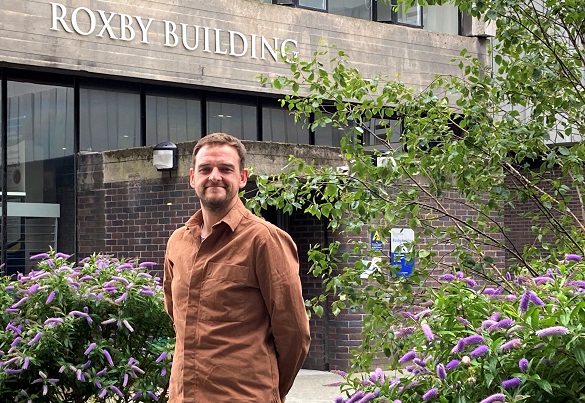Becoming an Expert: Using data science to identify health inequalities for people with dementia
Published on

James Watson is a final year PhD student in the University’s Geographic Data Science Lab, based in the Department of Geography and Planning.
His PhD `Spatial and social inequalities in healthcare and health outcomes for people living with dementia' is funded by the Engineering and Physical Sciences Research Council (EPSRC) and he is supervised by Dr Mark Green, Dr Clarissa Giebel and Dr Asangaedem Akpan.
Growing Importance
In the UK there are more people living with dementia (PLWD) than ever and an ageing population means the numbers of PLWD will continue to grow and particularly among those with severe dementia, who have more acute care need and require greater support in maintaining day-to-day routines many of us may take for granted.
Growing numbers of PLWD, particularly among those with more profound need, will exponentially increase the cost to health and social care. However, persisting funding shortfalls will result in greater unmet care need.
How PLWD experience dementia, healthcare services, and health outcomes differs based on demographic, socio-economic and spatial factors. Those already disadvantaged are likely to endure further detrimental impacts, including poor quality health and social care, faster progression towards more severe dementia symptoms and greater mortality risk.
Understanding who is most negatively impacted can help us address existing inequalities among PWLD, and negate the potential widening of inequalities. This can be done by analysing large databases of routinely collected data, including electronic health records of contact between PLWD and General Practice (GP) and hospitals.
What do I do?
My PhD involves applying data science methods to routine data to identify inequalities in healthcare use and health outcomes among a large population of people with diagnosed with dementia.
My first paper was a systematic review of how previous studies have used routine data to evidence inequalities in healthcare use, transitions into nursing or residential care, and health outcomes. Although we highlighted existing inequalities in dementia, we also noted existing research did not look at the simultaneous impact of more than one or two socio-demographic or spatial factors in outcomes in dementia. This is something I aimed to address in subsequent papers.
In two separate studies - using Clinical Practice Research Datalink (CPRD) data of over 140,000 people diagnosed with dementia in England - I evidenced variations in risk of mortality, and use of primary and secondary healthcare services. We highlighted risk of mortality and use of GP and hospital care differed as a result of numerous factors, including: age, gender, ethnicity, level of socio-economic deprivation, geographic region, and level of urbanity/rurality.
From the same population as my previous papers, my final data-based paper from my PhD aims to generate groups of PLWD, based on similarities in use of primary and secondary healthcare over time. This can evidence whether certain long-term healthcare pathways increase or reduce the risk of mortality. Looking at the socio-economic, demographic and spatial makeup of each of the groups can also identify if some groups are more likely to experience healthcare pathways which result in heightened mortality risk.
During my PhD and beyond, evidencing inequalities in healthcare and health outcomes for PLWD, we can make recommendations for changes to policy and practice that can improve overall care for PLWD, provide more equitable access to good quality services and narrow the inequalities gap.
I have been lucky to work with so many experts in their field, both in terms of the subject matter, practicalities of dementia and ageing, and providing care to PLWD, as well as the applied methods of exploring the aims of my PhD. Attendance and involvement in community groups, discussions with clinicians, and a public advisor on my PhD helps me to understand the practicalities of providing care and support to PLWD. Being part of the GDSL has given me a chance to learn from others with a great deal of knowledge and expertise and an incredibly diverse range of specialties. Here, I have been able to see how data science methods can produce and develop knowledge of the current issues impacting the world and how our research can address these challenges.
My PhD has allowed me to be involved in multiple research projects, as well as including publishing papers as a primary author. As well as my own research, I have been involved in research asking carers of the barriers to service access among PLWD, both during and pre- the COVID-19 pandemic, as well as the impact of household air pollution on risk of oesophageal cancer in Sub-Saharan Africa.
I have presented my work to stakeholders and decision-makers from all sides, and at local, national and international conferences.
I was also recently awarded Research Student of the Year at the North West Coast Research & Innovation Awards, hosted by the Innovation Agency and National Institute for health Research (NIHR). As a PhD I am incredibly lucky to have the support of a fantastic supervisory team, of the GDSL and wider Geography and Planning department, as well as discussing and working with people in applied, clinical settings who want the best for the people they care for.